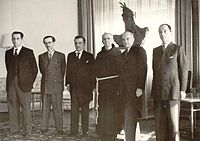- Mehdi Frashëri
-
Mehdi Bej Frashëri 
10th Prime Minister of Albania In office
October 22, 1935 – November 9, 1936Preceded by Pandeli Evangjeli Succeeded by Kostaq Kota 17th Prime Minister of Albania In office
October 24, 1943 – November 3, 1943Preceded by Eqrem Libohova Succeeded by Rexhep Mitrovica Personal details Born 28 February 1872
Gjirokastër, Albania (then Ottoman Empire)Died 25 May 1963 (aged 91)
Rome, ItalyPolitical party Balli Kombëtar Spouse(s) Nejre Frashëri Children Vehbi Frashëri
Mediha FrashëriProfession Prime Minister Religion Bektashi Mehdi (Bej) Frashëri (1872–1963) was an Albanian politician. He served as Prime Minister of Albania twice and was a supporter of Balli Kombëtar. Mehdi Frasheri helped writing the Albanian Civil code. At May 17, 1914, he was the Albanian representative that signed the Protocol of Corfu.[1] He was the cousin of Mit’hat Frashëri.
Contents
Biography
Early life
Mehdi Frashëri was born on 28th of February, 1872 in Gjirokastër. Mehdi Frashëri is from the notable Frashëri family. He studied in Vienna and served as governor of Jerusalem under the Ottomans, mayor of Durres under Prince Wied, and minister of the interior in 1920[2]. During the 1930s he held a myriad of significant posts, including prime minister from 1935 to 1936[3].
Italian occupation
 Members of the Albanian cabinet. From left to right, Fuat Dibra, Mihal Zallari, Mehdi Frashëri, Father Anton Harapi, Rexhep Mitrovica and Vehbi Frashëri
Members of the Albanian cabinet. From left to right, Fuat Dibra, Mihal Zallari, Mehdi Frashëri, Father Anton Harapi, Rexhep Mitrovica and Vehbi Frashëri
Frasheri was against Benito Mussolini and disliked the his policy of invading Albania[4]. Frasheri took it upon himself to broad cast scathing attacks against the invasion as well as address a remonstrance to Mussolini[5]. Following the departer of the government of Tirana, he urged young men with revolvers to distribute themselves to preserve order. When the invading troops were at the gates he sought asylum in the Turkish Legation, continuing to refuse to sign a declaration in support of the Italians. His personal courage impressed even the German minister, who successfully appealed to Rome to allow Frasheri to return home. Despite Italian guarantees, Frasheri was soon arrested and interned in Italy[6].
Frasheri, Who had sympathy for the Germans partly because he had studied in Austria, worked with German minister Erich von Luckwald, in the hopes of establishing closer relations and to gain some protection for the Albanians from the Italians[7].
Balli Kombëtar
After the capitulation of Italy, Nazi Germany took control of the Balkans. The Germans were appraised of his significance and began to search for him immediately after the invasion[8]. Frasheri was found and agreed, on 16 September, to return to Tirana for talks with Hermann Neubacher, Major Franz von Scheiger and Herr Schliep. After the end of the meeting, it was agreed that Albania would have its own sovereignty under Nazi Germany, similar to the Independent State of Croatia[9].
Frasheri agreed to serve as regent as well as head the council. The leadership of the council was originally designed to rotate, but Lef Nosi declined for heath reasons and Anton Harapi argued that as a Catholic monk he could accept no position in which he would be forced to sanction the death penalty. On November 3, 1943, Frasheri stepped down as Prime Minister and Rexhep Mitrovica took over. The Germans insisted that Frasheri still remain the head of the regency council.
After World War II
When the Partisans declared victory in Albania, the Germans evacuated, taking Mehdi Frasheri with them. Frasheri moved to Vienna and eventually settle in Rome, where he lived until his death[10].
References
- ^ Albania's Captives. Pyrrhus J. Ruches. 1965. P. 91.
- ^ Bernd Jürgen Fischer. "Albania at war, 1939-1945". http://books.google.com.au/books?id=vTZnAAAAMAAJ&pg=PA215&dq=mehdi+frasheri&hl=en&ei=nCJNTuv2IOjymAXAk4TrBg&sa=X&oi=book_result&ct=result&resnum=3&ved=0CDQQ6AEwAg#v=onepage&q=mehdi%20frasheri&f=false. Retrieved 18 August 2011.
- ^ Bernd Jürgen Fischer. "Albania at war, 1939-1945". http://books.google.com.au/books?id=vTZnAAAAMAAJ&pg=PA215&dq=mehdi+frasheri&hl=en&ei=nCJNTuv2IOjymAXAk4TrBg&sa=X&oi=book_result&ct=result&resnum=3&ved=0CDQQ6AEwAg#v=onepage&q=mehdi%20frasheri&f=false. Retrieved 18 August 2011.
- ^ Owen Pearson. "Albania in the twentieth century: a history, Volume 3". http://books.google.com.au/books?id=3_Sh3y9IMZAC&pg=PA374&dq=mehdi+frasheri&hl=en&ei=nCJNTuv2IOjymAXAk4TrBg&sa=X&oi=book_result&ct=result&resnum=7&ved=0CEcQ6AEwBg#v=onepage&q=mehdi%20frasheri&f=false. Retrieved 18 August 2011.
- ^ Owen Pearson. "Albania in the twentieth century: a history, Volume 3". http://books.google.com.au/books?id=3_Sh3y9IMZAC&pg=PA374&dq=mehdi+frasheri&hl=en&ei=nCJNTuv2IOjymAXAk4TrBg&sa=X&oi=book_result&ct=result&resnum=7&ved=0CEcQ6AEwBg#v=onepage&q=mehdi%20frasheri&f=false. Retrieved 18 August 2011.
- ^ Bernd Jürgen Fischer. "Albania at war, 1939-1945". http://books.google.com.au/books?id=vTZnAAAAMAAJ&pg=PA215&dq=mehdi+frasheri&hl=en&ei=nCJNTuv2IOjymAXAk4TrBg&sa=X&oi=book_result&ct=result&resnum=3&ved=0CDQQ6AEwAg#v=onepage&q=mehdi%20frasheri&f=false. Retrieved 18 August 2011.
- ^ Bernd Jürgen Fischer. "Albania at war, 1939-1945". http://books.google.com.au/books?id=vTZnAAAAMAAJ&pg=PA215&dq=mehdi+frasheri&hl=en&ei=nCJNTuv2IOjymAXAk4TrBg&sa=X&oi=book_result&ct=result&resnum=3&ved=0CDQQ6AEwAg#v=onepage&q=mehdi%20frasheri&f=false. Retrieved 18 August 2011.
- ^ Bernd Jürgen Fischer. "Albania at war, 1939-1945". http://books.google.com.au/books?id=vTZnAAAAMAAJ&pg=PA215&dq=mehdi+frasheri&hl=en&ei=nCJNTuv2IOjymAXAk4TrBg&sa=X&oi=book_result&ct=result&resnum=3&ved=0CDQQ6AEwAg#v=onepage&q=mehdi%20frasheri&f=false. Retrieved 18 August 2011.
- ^ Bernd Jürgen Fischer. "Albania at war, 1939-1945". http://books.google.com.au/books?id=vTZnAAAAMAAJ&pg=PA215&dq=mehdi+frasheri&hl=en&ei=nCJNTuv2IOjymAXAk4TrBg&sa=X&oi=book_result&ct=result&resnum=3&ved=0CDQQ6AEwAg#v=onepage&q=mehdi%20frasheri&f=false. Retrieved 18 August 2011.
- ^ Bernd Jürgen Fischer. "Albania at war, 1939-1945". http://books.google.com.au/books?id=vTZnAAAAMAAJ&pg=PA215&dq=mehdi+frasheri&hl=en&ei=nCJNTuv2IOjymAXAk4TrBg&sa=X&oi=book_result&ct=result&resnum=3&ved=0CDQQ6AEwAg#v=onepage&q=mehdi%20frasheri&f=false. Retrieved 18 August 2011.
Preceded by
Pandeli EvangjeliPrime Minister of Albania
October 22, 1935–November 9, 1936Succeeded by
Koço KotaPreceded by
Eqrem LibohovaPrime Minister of Albania (under Nazi Germany)
October 24, 1943–November 3, 1943Succeeded by
Rexhep MitrovicaHeads of State of Albania Provisional Government of Albania (1912-1914) Principality of Albania (1914-1925) Albanian Republic (1925-1928), President Albanian Kingdom (1928-1939), King Italian Occupation (1939-1943) German Occupation (1943-1944) Communist Albania (1944-1991) Republic of Albania (since 1991) * Acting head of statePrime Ministers of Albania Provisional Government of Albania (1912-1914) Principality of Albania (1914-1925) Albanian Republic (1925-1928) Albanian Kingdom (1928-1939) Italian Occupation (1939-1943) German Occupation (1943-1944) Communist Albania (1944-1991) Republic of Albania (since 1991) Categories:- Prime Ministers of Albania
- Albanian Shi'a Muslims
- 1872 births
- 1963 deaths
- Balli Kombëtar
- Albanian politician stubs
Wikimedia Foundation. 2010.
